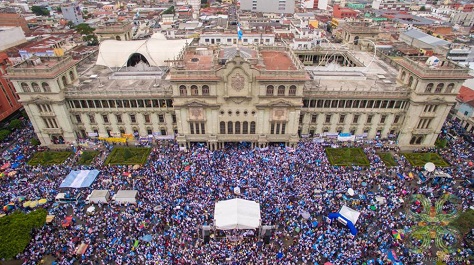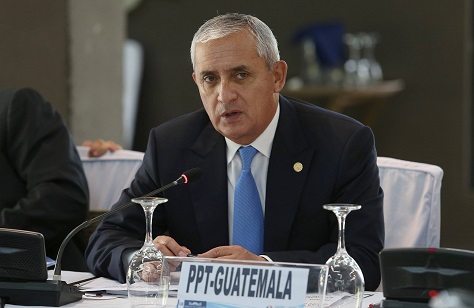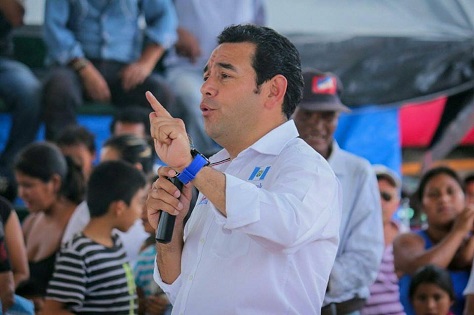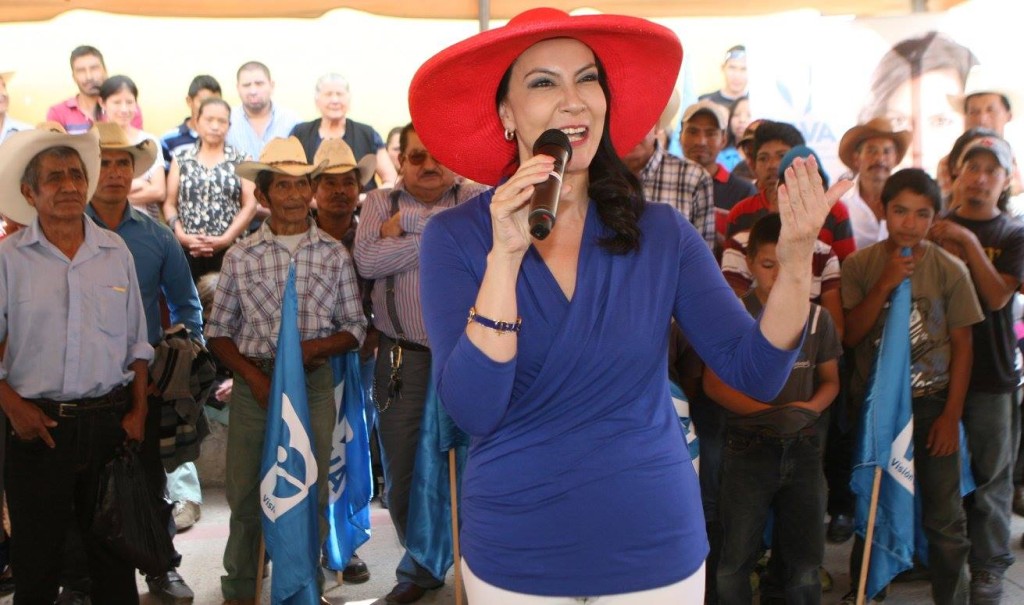 Photo credit to Quetzalvision.
Photo credit to Quetzalvision.
Six days before Guatemalans go to the polls to choose a successor to president Otto Pérez Molina, the country’s congress voted to strip the term-limited incumbent of his immunity, opening the way for what might become the first prosecution of a Guatemalan president on corruption charges in Guatemala.![]()
The vote today in Guatemala’s Congress was historic, and it will make Sunday’s unpredictable general election even more difficult to forecast. But it wasn’t exactly a bombshell, even though it seems like a key turning point in the gradual maturation of Central American democracy and law.
When Pérez Molina, a retired army general, took office, he quickly found himself on Washington’s bad side when he argued for drug legalization as a solution to the decades-long failures of the US-led war on drugs. At home, however, he was regarded as a tough-on-crime conservative whose military background might help police efforts to reduce drug- and gang-related violence, despite murmurs about his role in various human rights abuses during Guatemala’s sprawling decades-long civil war that reached a gruesome nadir in the early 1980s.
During his presidency, however, Guatemalans became increasingly angry over the corruption that, at best, took place on Pérez Molina’s watch and that, at worst, directly implicates Pérez Molina (pictured above). So far, 14 ministers have resigned as a result of a wide-ranging customs fraud scheme, referred to as La Línea, including seven ministers in August alone and finance minister Dorval Carías last week. Roxana Baldetti, Guatemala’s first female vice president, resigned in May and is now in prison pending trial on corruption charges. Pérez Molina continues to deny any wrongdoing on his part, and he defiantly refused to resign just last week in a press conference, buttressed perhaps with the support of Guatemala’s wealthiest businessman, telecom magnate Mario López Estrada.
Since a United Nations report first revealed the customs scandal in April, however, many Guatemalans have grown skeptical of Pérez Molina’s claims of innocence and, though he survived a congressional vote to remove his immunity last month, prosecutors later announced that they believed Pérez Molina is implicated in the customs scandal. Today’s congressional decision will allow prosecutors to move forward with tax evasion, money laundering or other corruption charges, and it makes it much less likely that Pérez Molina will survive in office until January, when Guatemala’s next president will assume power. Notably, even members of the conservative Partido Patriota (PP, Patriot Party) that Pérez Molina founded in 2001 supported the decision to lift his immunity, the recommendation of a congressional committee examining the scandal.
Corruption is rampant in the region, but voters are increasingly engaged and have started pushing back against the perception of widespread graft. Protesters in Honduras this summer are demanding accountability from officials, and in last year’s Costa Rican election, outgoing president Laura Chinchilla’s administration was seen as so scandal–plagued that her party’s candidate, San Jose mayor Johnny Araya, withdrew from a runoff rather than face a shellacking from his rival, the soft-spoken diplomat and political neophyte Luis Guillermo Solís.
So where does that leave the Guatemalan presidential election?
A betting man might argue that Manuel Baldizón (pictured above) is still poised to become Guatemala’s next president. Pérez Molina himself is so reviled that the Patriot Party’s candidate was forced to withdraw from the current election altogether.
More importantly, in each of Guatemala’s elections since 1999, the runner-up from the previous election has won the presidency:
- 1995’s runner-up, arch-conservative Alfonso Portillo, won the 1999 election;
- 1999’s runner-up, the center-right Óscar Berger, won the 2003 election;
- 2003’s runner-up, the center-left Álvaro Colom, won the 2007 election; and
- 2007’s runner-up, Pérez Molina, won the 2011 election by a 7.5% margin against Baldizón.
So it’s not surprising that Baldizón generally leads polls or that his campaign slogan, ‘Le toca,’ translates to ‘His turn.’
Nevertheless, the scandal that engulfed Pérez Molina and his administration has unleashed a wave of fury against the Central American country’s political elite, and Baldizón may be swept aside by the same anger that may lead, within days, to the resignation or even impeachment of Pérez Molina.
The 45-year-old Baldizón served a single term in the Guatemalan congress after the 2003 election. From 2006 to 2008, he supported the center-left presidency of Álvaro Colom, then the leader of the Unidad Nacional de la Esperanza (UNE, National Unity of Hope). In 2010, Baldizón formed the more right-leaning, more populist Libertad Democrática Renovada (LIDER, Renewed Democratic Liberty) in advance of the 2011 elections. Though he ultimately lost the 2011 presidential runoff to Pérez Molina by a 7.5% margin, it was still a strong enough showing to make Baldizón the frontrunner in the 2015 vote. Although LIDER won a respectable 14 seats in the unicameral 158-member Congreso in the 2011 election, Baldizón had grown the party’s caucus to 52, gradually picking up the support of many local leaders as well.
As Guatemalans celebrate an inflection point for their country’s rule of law, Baldizón is poorly placed to capitalize on the prevailing mood. Under Guatemala’s sketchy campaign financing, there are more than a few accusations that LIDER has financed its success with illicit money, including proceeds from drug trafficking. Edgar Barquín, LIDER’s vice-presidential candidate and a former president of the Bank of Guatemala, is under investigation himself for money laundering. Until recently, LIDER joined forces with the Patriot Party to retain Pérez Molina’s immunity. Even on Monday, when Baldizón wanly instructed his party members to support the growing efforts to remove presidential immunity, many LIDER legislators refused to show up. This meant that, ironically, Patriot Party legislators were the ones to achieve the two-thirds hurdle to pave the way for a presidential prosecution. Despite the resources of the Baldizón campaign, many Guatemalans fear he would be just as corrupt as Pérez Molina, doubting a Baldizón administration would aggressively pursue Pérez Molina’s prosecution.
But it’s not just Baldizón. Sandra Torres, the former first lady and Álvaro Colom’s ex-wife, has struggled as the UNE’s standard-bearer in this election cycle as well. All of which has been to the benefit of Jimmy Morales (pictured above), a comedian, actor and director, running as an independent candidate in the election. Morales, with little in the way of discernible ideology or clear policy imperatives, has rocketed to second place in many polls, and there’s a chance that his socially conservative, nationalist and charismatic anti-corruption stand could boost him to first place on Sunday. Though Morales, by virtue of his novelty, lacks the shady connections of his competitors, there’s a fair whiff of authoritarian populism to his candidacy.
Either way, everyone expects that no candidate will win an absolute majority and so the race will advance to a runoff on October 25, and it is likely that Baldizón could face a surging Morales.
Given the fluidity of an election that will take place in the penumbra of Pérez Molina’s legal defeat just six days earlier, any number of minor candidates could emerge from among the 14-candidate field, including Alejandro Giammattei, a former director of Guatemala’s prisons system who is waging his third consecutive campaign for the presidency, and Roberto González, a popular former energy minister who unsuccessfully ran for mayor of Guatemala City in 2011. But none seems to have as much promise for a breakout as Zury Ríos .
Ríos (pictured above) is the daughter of Guatemala’s former military dictator Efraín Ríos Montt, whose year-and-a-half in power in the early 1980s resulted in the deaths of up to 200,000 Guatemalans, including a massacre of indigenous Maya in the country’s highlands. While Ríos Montt has battled charges of genocide for years (most recently on the grounds that, at 89 years old, he is mentally unfit to stand trial), at least one national tribunal two years ago found him guilty of crimes against humanity, a conviction that Guatemala’s supreme court overturned.
Moreover, the party that her father founded, the Frente Republicano Guatemalteco (FRG, Guatemalan Republican Front) is generally a hard-right, socially conservative and evangelical party. The last time that it won the presidency was in 1999, under Alfonso Portillo, who was so tainted by corruption that he immediately fled to Mexico when his term ended. Portillo was ultimately extradited to the United States, where he pled guilty to money laundering charges and served in prison for nearly a year until his release in February 2015.
If not for the baggage of both family and party, Ríos might actually be far more attractive as a potential president, with a coherent platform of neoliberal reforms that might make Central America’s largest economy more attractive to foreign investment and tourism.
In addition to a new president, voters will also elect all 158 members of the Guatemalan congress and the country’s mayors and city councils.



